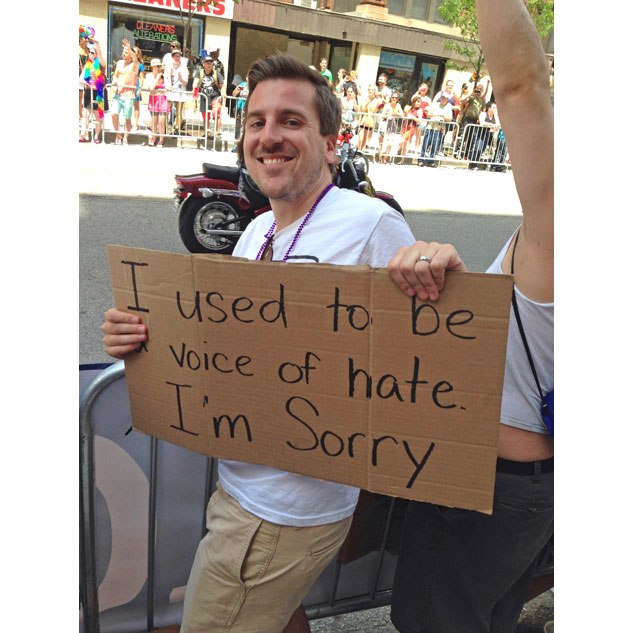
07 Jul Christians Say ‘Sorry’ at Chicago Pride
It was an unlikely sight: a group of Christians at Chicago Pride parade stood in front of protesters with signs apologizing to the LGBT community. The “I’m Sorry” campaign, created by the Marin Foundation, was conceived as a means for Christians to apologize to the ways their fellow believers have caused harm.
The foundation’s approach has received both praise and harsh criticisms from both LGBT and Christian activists. Its work has also won awards, invitations to the White House, and contract work with the United Nations.
The “I’m Sorry” campaign started in 2010 at Chicago Pride and since has spread to multiple cities, including Los Angeles, Atlanta, and even Sydney. “We view this campaign as our commitment to making the first step towards relational reconciliation in a tangible way,” says the Marin Foundation’s website in explaining the campaign.
The campaign took off in 2010 after a photo of Andrew Marin, founder of the Marin Foundation, went viral; being shared over 34 million times. The photo was of Marin hugging a paradegoer who was in his underwear and Marin’s blog post “I hugged a Man in His Underwear. And I’m Proud.” told the story of a straight, white, male Christian being sorry for his former homophobic ways. The picture made the #1 spot on Buzzfeed’s “21 Pictures That’ll Restore Your Faith In Humanity.”
Four years later, the campaign is going strong with a record number of participants. “In the midst of our country’s cultural shift — where many, including evangelical Christians, are moving toward a more progressive and, I would contend, Christ-centered understanding in discussions surrounding the intersection of faith, gender, and sexuality — there is a need for some folks to acknowledge the harm done toward the LGBTQ community in the name of God and religion,” Marin Foundation executive director Michael Kimpan tells The Advocate.“The ‘I’m Sorry’ campaign provides such an opportunity, to offer an apology and reparations face to face, building bridges of reconciliation between those who once spoke words of hate and intolerance and now desire to speak words — and actions — of love.”
Kimpan wrote a refection piece on the experience on his personal site, saying LGBT people passing by protesters were challenging him to be a better Christian. The parade participants marched by protesters and responded to the hate with “We still love you!” and “Even though you hate us, we love you!”
Source: Аdvocate



